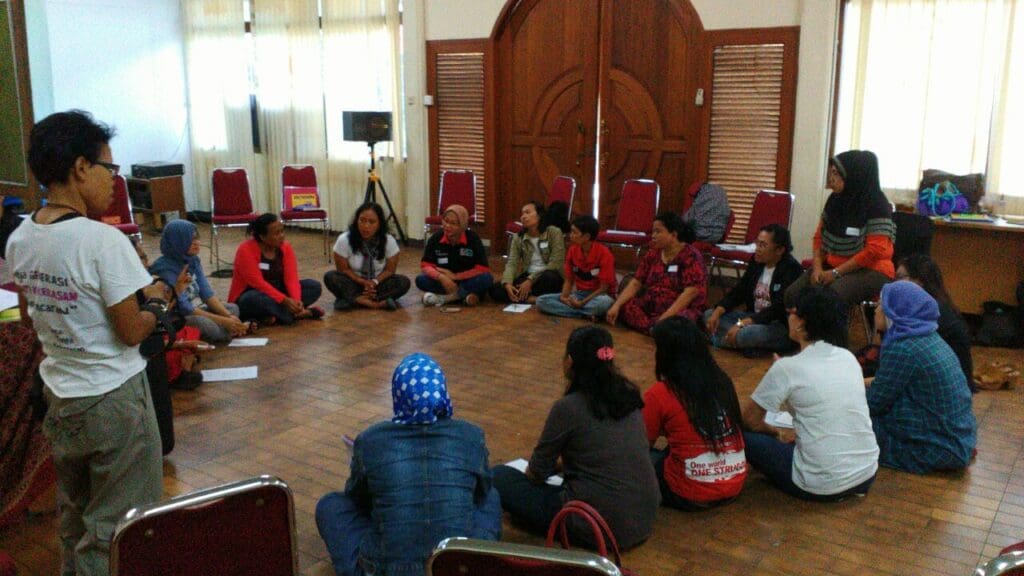Grassroot Women’s Congress was held as a protest to National Women’s Congress by Agency for Cooperation of Women’s Organizations – Badan Kerjasama Organisasi Wanita (BKWO) in August 24 – 26, 2023 for the reason that they mentioned did not include grassroot representative. Grassroot Women’s Congress is considered an alternative space to voice grassroots movements.
“This is way to maintain women’s grassroot movement in Indonesia and mainstreaming marginalized voice” stated from the invitation letter to Konde.co
On August 23, 2023, the Grassroot Women’s Congress discussed “women, art and living space.” The next day, it continued with silent protest in front of the location where the National Women’s Congress was taking place. They also did online people’s assembly to bring action to the roots of oppression in gender-based violence on violation of living space on August 25 – 26, 2023.
First, discussion to respond to Sukinah, a Kendeng woman who experienced environmental damage caused by activities of Kendeng cement manufacturer. Although peasant women won supreme court decision No 99/PK/TUN/2016 to suspend cement manufacturer, unfortunately, Central Java Governor annulled the decision with new permission to return cement manufacturer operation. Sukinah insisted that the government must eliminate those manufactories because Kendeng inhabitants already did all procedures through juristic and non-juristic, but it still gained inequality.
Read More: Anti-LGBT Regional Regulations Rise, Discrimination Increasing Rapidly
Second, Sri Mariyati, a woman from Pakel Banyuwangi demanded settled farming without intimidation and criminalization. The agrarian conflict provoked Pakel’s women to struggle to provide financial needs for the family. The state apparatus chose to protect manufacturers and caused many women to get arrested.
Third, a woman from Porong Sidoarjo, Harwati talked about uncertainly living caused by Lapindo “mud volcano”. After fifteen years, they still awaited full settlement in environmental and economic. Harwati stated that the disastrous “Lapindo Mudflow” forced people to build solidarity in the Porong area, especially regarding economic recovery for women.
Fourth, Susi from Wadas Melawan sued to have a sustainable environment. “We only want to preserve our environment for the next generation, but the government violated it.” Susi stated. In addition, Susi mentioned that people in Wadas often experienced intimidation to hand over their land. Many women and children became traumatized by state apparatus that did violence, such as oppression, harm, and hitting. Moreover, women are now divided by petty rivalries caused by those social impact.
The rest of the discussion focused on the impacts of environmental pollution. The discussion was led by women from coast of Timbulsloko and Cilacap. Women from the RUM factory and Demak added discussion as they were impacted by the briquettes manufacturing. They focused on the impact of health problems and hope for the state to overcome them.
Read More: 25 Years of Reform: Stop Empty Promises for Women in the May Tragedy
In session II emerged issues about economic and political inequality, some of them came from women in SPRT Merdeka, fisherwomen in Demak, domestic workers, peasant labour workers in Pundenrejo, women in Pari island, and manufacturing workers. Nur as Domestic Worker Union – Serikat Pekerja Rumah Tangga (SPRT) Merdeka representative mentioned their unrecognized status as a worker. It is shown by no illegal contract, social and health insurance, and legal protection because the Draft Law on the Protection of Domestic Workers (RUU PPRT) has not yet been passed since 2004. The statement was supported by Ida Fitriyani, who added the issue of the vulnerability of violence in the private sphere.
Aas as a seaweed farmer revealed different issues in Pari Island, they were forced to change their occupation because of conflict with manufacturers in fighting for land rights. “They continued to pursue us to sell our land” stated Aas who has to attend court in Jakarta every week.
The next day, the people’s assembly discussed “Women, politics and democracy.” The issues focused on gender diversity, women in journalism, democracy freedom, women’s rights and politics, and the reconciliation of the 1965 tragedy. Survivor of 1965 tragedy, Svetlana was narrated how they have been stigmatized, stalked, and traumatized. “I have been watched every day. I believe it is not only me but also the others.”
Read More: The Bromance Keeping Men in A Loop: An Impact on Workplace
Furthermore, Misbi Parjianti from Srikandi Lintas Iman – Srinkandi interfaith Organization emphasized the social conflict caused by religion. In related cases, women became vulnerable as they were not involved in solving religious conflicts. Many women also add to the problem of mainstreaming the importance of gender-sensitive policies to solve political and democratic issues.
The National Women’s Congress records the progress and setbacks of the women’s movement
On the contrary, critics came to some names who became speakers at the National Women’s Congress (NWC), August 24 – 26, 2023, in Semarang, Central Java. One of them was Ganjar Pranowo, governor of Central Java, who was considered unable to solve the problems of environmental victims such as Kendeng.
Honor guest Puan Maharani, the current speaker of The House of Representatives, came to become the closing speaker and was also considered unsuitable speaker. She was always challenging to invite to negotiate about the Draft Law on the Protection of Domestic Workers. On the other hand, NWC was unable to invite victims who were essential to speak about their struggles in front of governments and policymakers.
Musruchah, Congress steering committee claimed that NWC was held to portray progress and important records for policymakers. Indonesia Women Coalition – Koalisi Perempuan Indonesia (KPI), Mike Verawati as general secretary gave positive respond to NWC as it can be used as part of women movement. To respond to critics of NWC, the congress committee gave positive reactions because those considered a democratic part for women to show the dynamic of the women’s movement.
Read More: Submitted to UNESCO, What is the Politics and History of Kebaya?
In her opening speech at the NWC, Nawal Nur Arofah said that, currently, it is challenging to claim equality for women at all stages. “Poverty, unpaid work, double burden, domestic violence, sexual violence, trafficking, land-use rights, and food sovereignty still become an issue in Indonesia. It hinders women’s movement” She stated.
NWC has been an annual congress since 2018 but it could not be held during the pandemic. The theme of 2023 congress was women leadership. Gusti Ayu Bintang Darmawati, Ministry of Women Empowerment and Child Protection, who opened the congress, indicated that the women’s movement should not stop only at the domestic level. It should become a sustainable movement that should evolve at every stage. “Women should participate also in the public sphere to present their position to the community”
She added that the government has guaranteed gender equality through regulation. For example, she mentioned Presidential Instruction No.9/2000 concerning gender mainstreaming, CEDAW stratification or non-discrimination regulations against women, and the Beijing Platform for Action (BPFA).
“Those regulations show the position of gender in interdisciplinary issues, such as social, economic, law, etc. Thus, we should the importance of women’s position in Indonesia. Women already became an actor in national development.”
Read More: How to Close the Gender Gap in Employment?
Nevertheless, Darmawati reflected to problems on women and children in Indonesia, such as gender inequality, discrimination, and stereotyping. She encouraged to continue women’s empowerment because the government couldn’t work it alone; for example, although Central Java already had responsive gender regulation, it still became an issue at the national level.
Next, the National Women’s Congress discussed women’s leadership at the political level, environment, food sovereignty, legal reform, gender-based violence, culture and media. NWC also generated some recommendations about advancement and challenges within four years, such as women’s celebration in development and achievement.
Challenges and obstacles in eliminating all forms of discrimination against women as human rights should be discussed. Next, an action framework strategy must be formulated involving a coalition of organizations such as the government, parliament, national human rights organizations, academics, political parties, corporations, social organizations, NGOs and other civil movements. Recommendations from NCW will become a work plan for women’s movements. It could become a tool for negotiations with policymakers at every level.
Some organizer of NCW was Agency for Cooperation of Women’s Organizations – Badan Kerjasama Organisasi Wanita (BKWO) in Central Java, Dharma Wanita Unity UNDIP, Empowering and Family Welfare (PKK) community in Central Java, and LRC-KJHAM. In addition, there were Rahima, KUPI, Indonesia Women Coalition (KPI), KOPRI PMII Central Java, IMM Central Java, Kohati Central Java-Special Regions of Yogyakarta, Women Study Centre, academics, students, and government and non-government organizations.
(Translated by Theresia Pratiwi Elingsetyo Sanubari)













